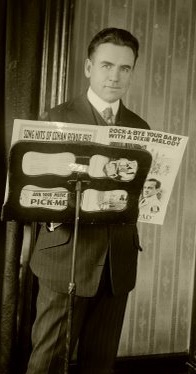Would it surprise you to learn that the very first million-selling record in country music — “The Wreck of the Old 97” backed by “The Prisoner’s Song” — was made way back in 1924? And would you be even more surprised to hear that the record wasn’t made by a legend like Jimmie Rodgers, but by a former opera singer named Vernon Dalhart? And to add to the confusion, that wasn’t even his real name, just one of dozens he used on the thousands — yes, thousands — of records he made during his career.
Although he was Texas-born and spent some time on a ranch while growing up, Marion Try Slaughter went in an entirely different direction when he started his musical career. He’d studied at the Dallas Conservatory and had every intention of becoming an opera singer, even moving his family to New York around 1910 to  pursue his muse. In his twenties by then, he had to work various other jobs for a while but after a couple of years began to find singing parts in light opera.
pursue his muse. In his twenties by then, he had to work various other jobs for a while but after a couple of years began to find singing parts in light opera.
Before too long he also discovered the rapidly growing popularity of phonograph records, which were gradually replacing Thomas Edison’s original cylinders. He was soon auditioning for the big man himself (who was covering his bets by joining the platter revolution while also continuing to make cylinders) and subsequently began furnishing vocals for Edison Records.
His early efforts mostly consisted of pop tunes, light classics, and minstrel songs, but as the years passed he covered pretty much every genre. His reedy voice and vocal style didn’t change much from tune to tune, but he recorded under a variety of different names, including Frank Evans, Vernon Dale, Tobe Little, Bob White, Hugh Lattimer, Sid Turner, Al Craver, and countless others. It was a common practice at the time, possibly to keep artists from becoming too well known and asking for more money.
By the time he made his big record in 1924, he was mostly working for the Victor Talking Machine Company, an outfit that was dominating the business at that point. By some accounts, his big record sold something like seven million copies, a stunning number in that era. It kick-started a wider appreciation for country music, and led to the discovery of future legends like Jimmie Rodgers and the Carter Family.
Needless to say, the name ‘Vernon Dalhart’ became a familiar one and he mostly used it from then on. But even though he kept making records well into the 1930s, his singing style didn’t really suit modern fans. By the time he died in 1948 he was working as a night watchman, and he wasn’t making a dime from any of his thousands of records. Many years later he was voted into the Country Music Hall of Fame for his historic contributions, even though his country music credentials might have been a little iffy.

Vernon Dalhart – “The Wreck of the Old 97”
Really enjoyed the post. I was especially interested to learn about the release of “The Wreck of the Old 97” being the first ever million seller. According to Joel Whitburn’s history of pop music Vernon’s biggest hit was “The Prisoner Song” released the same year as “The Wreck of the Old 97”. According to Whitburn’s history “The Prisoner Song” went to Number 1 in March of 1925 and stayed there for 5-weeks. Dropped back down the charts for several months and then went back to Number 1 in December for another 7-weeks. Again… thanks for sharing.
LikeLike
Thanks for the input, Alan. One of the fun things about all this is digging deeper into things. I found that comment by Whitburn too, but took it differently. Both he and James Manheim on Allmusic seem to indicate that the two songs were A and B sides of the same record, and my understanding was that initially “Old 97” got the attention and a little later the “Prisoner” got its turn. In any case, that platter apparently sold seven million copies before it disappeared.
LikeLike
Well whether Tweedledee or Tweedledum, I appreciate you opening up a bit of musical history that I was unaware of that actually seems quite important, especially as relates to the genre of country music.
LikeLike
Thanks again, Alan. It was just something I stumbled on while following another story, but it turned out to be fascinating to me too.
PS Your Tweedledee, etc, comment reminded me of this post from several years ago!
LikeLike
Oh yes, very familiar with the song and the artists. I actually have both versions in my personal collection.
LikeLike
Marion Try Slaughter, no wonder he changed his name so often.
LikeLike